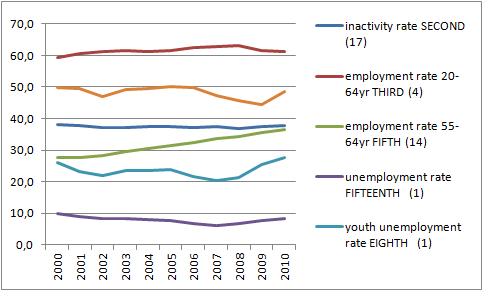So here is Italy’s labor conditions for the past decade at a glance for you. A check-up for a sick patient.
First, that we are stuck in a trap of some sort from which we have not been able to get out in 10 years time. Only the employment rate for the oldest (55-64 years old) has improved due to a series of pension reforms.
You might have also noticed the cyclical impact of this downturn on the unemployment rate (total and the youth one). Significantly, our long-term unemployment is rising dangerously. And we know that the next step of that is the even more fearsome condition of ending up being inactive. The inactivity rate in Italy remains high, too high, and needs an explanation and a cure.
Look at the legend explaining the lines. You will see a ranking posted in alphabetical letters. That is how worse is Italy among the club of the 27 EU countries (so for example while as for inactivity we are the second worse, for the total employment rate we are the fifth worse ones).
So it looks like we are OK with unemployment but bad for inactivity. Mmm. Let’s see what Spain does. You read Spain’s performance again in the legend, this time by checking tha arabic number. So Spain is currently the unemployment worse performer in the EU, but doing much better than us Italians in terms of inactivity.
Why choose Spain? Well, it is known that labor statistics in both countries are affected by black market measurement problems. And that many in both countries work in the underground economy. So maybe we should have expected more similarities between the 2. But maybe things are not that different after all.
Indeed, consider this. A high unemployment rate in Spain implies that many declare they are trying to find a job and do not succeed. In Italy, instead, a high inactivity rate implies that many do not look for a job, while fewer look for it unsuccessfully (low unemployment rate). Could it be that in Spain there is an incentive to simply declare that one has looked for a job while in Italy ones does not have any?
The answer seems to be positive: an unemployed Spanish citizen has a right to receive 65% of the average national salary as unemployed and the subsidy period lasts 2 years for those who had worked 6 years before losing the job. In Italy there is no unemployment subsidy. So I submit to you the hypothesis that if Italy were to introduce unemployment subsidies like in Spain, our inactivity rate would simply collapse and our unemployment rate would jump high simply because workers would find an incentive to file for the subsidy. But not much else would change. No big improvement, that is.
The Spanish and the Italian problem is thus not so much to create more flexibility through temporary contracts as some propose nowadays. Rather, it is one of making firms that operate in the underground economy emerge and turn legal with its workers. To do that, one should however aim at not making the firm finally prefer to shut down rather than to become legal. For this to occur, less red tape and less pay-roll taxes would help.
But we are still talking about firms that are not that competitive to start with (after all, that’s why they chose not to produce in the regular economy in the first place). Firms that, to survive, need to be able, one day, to compete in a highly globalized world. Firms that therefore need much more than “any” worker. As Fareed Zakaria recently mentioned in the Washington Post, “in a world filled with cheap labor, rich countries are better off with highly skilled workers, making premium products, with a focus on long-term growth and social stability“.
So, if Spain and Italy are really serious about labor reform, stop thinking about introducing useless flexibility or unemployment subsidies. We have enough of that. What we need is less red tape for firms, less taxes on work (more subsidies on employment) and more public and private investment in skills build-up and training.
